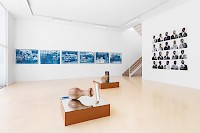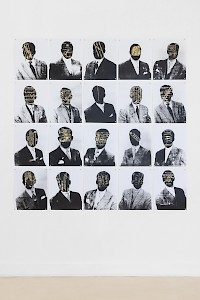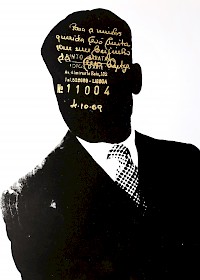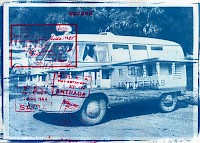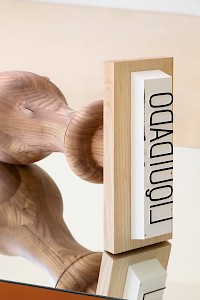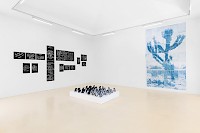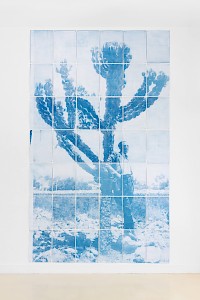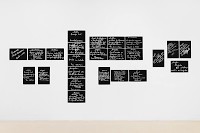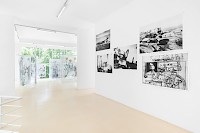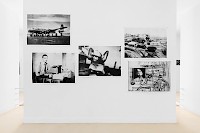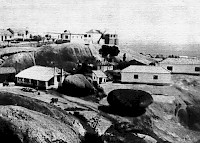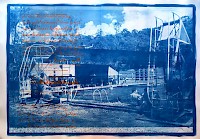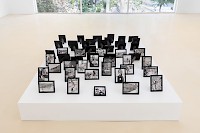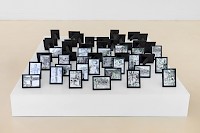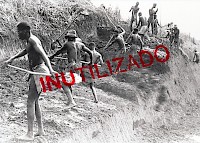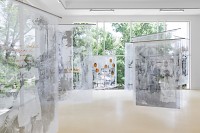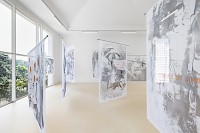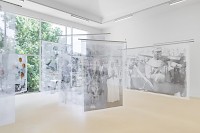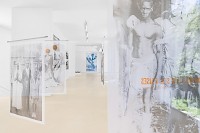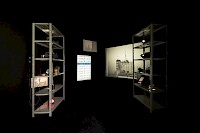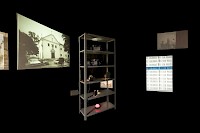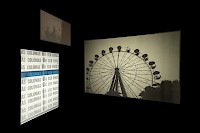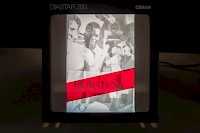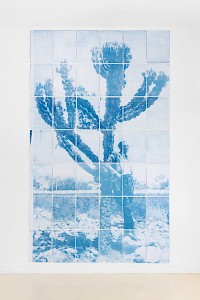Exhibition
The Colonies will be Countries.
Solo exhibition Delio Jasse
13.04.2024 – 30.06.2024
Pavilhão Branco, Museum of Lisbon
The Colonies will be Countries
Artist: Délio Jasse
Curator: Marta Jecu
THE IMAGE IS A TEXT
'The Colonies will be Countries'1, solo exhibition Delio Jasse, Galerias Municipais
The solo exhibition of Delio Jasse 'The Colonies will be Countries' makes an overview of the artist's diverse approaches of archive material, from sculpture, to immersive sound and projection environments, to cyanotype and photographic installation. His multimedia image-based work, takes as a starting point registers from the Portuguese colonial period in Angola, such as images, postcards, texts of official documents, administrative stamps. Delio Jasse photographs photographies, revisiting the processes in which the image develops its power of persuasion and delusion.
He appropriates and de-contextualises discarded vernacular images and documents, turning the gaze from what is depicted in the images (and their anecdotal value), upon the viewer himself : the photographic camera of the colonial photographer. This exhibition reflects on the many ways in which codes of representation construct the politics of the visible and the way in which images not only reveal, but also occult 'the real'.
“The best thing about a picture is that it never changes, even when the people in it do.” - said Andy Warhol in 'The Philosophy of Andy Warhol', first published in 1975 by Harcourt Brace Jovanovich Press.
Andy Warhol was maybe the first who conceptualised photography not as a pictorial or cinematic narrative – a story told visually – but as an object. Photography is launched by him not as the act of taking images, and neither as a recording of anecdotal and fluctuating instants of the depicted characters, but rather as a conceptual statement with its own identity (independently of what it illustrates), a material presence that can be reiterated in a plurality of media, from serigraph, to poster, to film, which re-connote its significance.
In various interviews and dialogues Delio Jasse situates himself on a similar artistic position regarding the meaning of photography. His images superposed in various layers and traversing multi-media embodiments, are on one hand ready-mades (appropriated personal archive images), on the other hand detach themselves from individual storytelling, anonymising the depicted characters. Beyond the anecdotes of personal stories of the Portuguese living in Angola during the colonial time, these images are 'read' by him as documents, as codes of representation – very similar to Andy Warhol´s philosophical reading of images as tools in the politics of visibility.
In fact it was Andy Warhol, who had an important role to play for the development of visual studies, which resituate the message of images from what they show, towards what they mean as social and political statements.
As a photographer, Delio Jasse assumes and brings a step further this conceptual orientation and locates it in the important field of reflection on what we could call the Politics of In-visibility in a colonial context and its perpetuated repercussions until today.
This exhibition intends to map the plurality of ways in which Delio Jasse reveals 'the image' as an abstract code of representation. He mostly does so by assuming the look of the colonizer – by appropriating his family pictures, his gaze, his photographic camera, his codes of representation and even the 'white subject' in the colonial period before Angola´s Independence. I asked myself many times, why would Jasse do so, instead of embodying and defending the position of the Angolan and his cultural view on the colonial past, that is under-represented by the Euro-centric production of images?
Images are powerful codes of discrimination, specifically through the messages that they subliminally impose to the viewer, which pass as self-understood, as 'documentations' of a certain 'reality'.
Delio Jasse explains that his gaze is directed in fact not upon the depicted subject, but most of all, upon a mentality, formed in the long centuries of colonial domination. He lines out the mechanics of this 'European look' upon the 'Other'. In this sense, these images are for him not the document of certain happenings, a personal story, a moment of life, but evidences of these games of representation that the colonizer played with the colonized subject. They reveal stereotypes, systems of visibility, rhetorics, imaginaries that correspond to collective convictions, to not-assumed believe systems, which contributed in time to collective manifestations of power in the framework of the colonial system. This gaze structured the European history of representation and of photography. 'My photographies are mirrors, exercises of bringing into awareness the 'European' gaze. With these images I want to start a debate, to cause a refresh.'2
Marta Jecu
Lisbon, March 2024
1'The Colonies will be Countries' / 'As Colonias vão ser Paises' is the title of the opening article in the Portuguese journal O SECULO, appeared on the 29th July of 1974, right after the Carnation Revolution.
2Delio Jasse, unpublisghed Interview March 2024.
